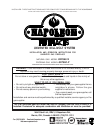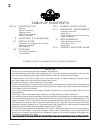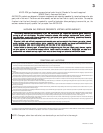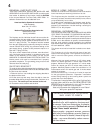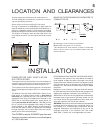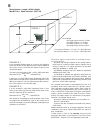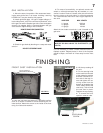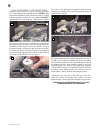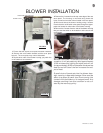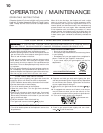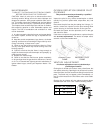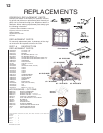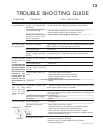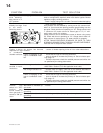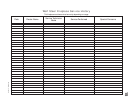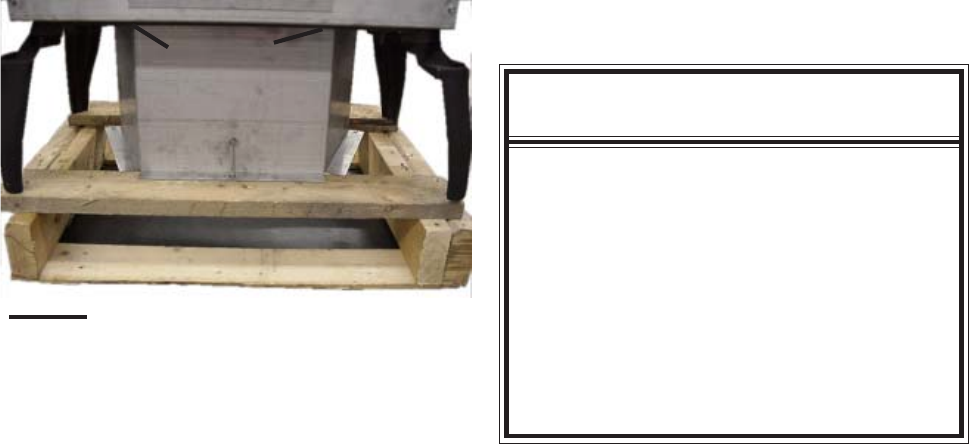
4
W415-0204 / C / 10.02.01
GENERAL INSTRUCTIONS
THIS GAS FIREPLACE SHOULD BE INSTALLED AND
SERVICED BY A QUALIFIED INSTALLER to conform with
local codes. In absence of local codes, install the GVFS60
to the current National Fuel Gas Code, ANSI Z223.1 In-
stallation Code which can be obtained from:
American Nation Standards Institute Inc.
1430 Broadway
New York, NY 10018
or
National Fire Protection Association Inc.
Batterymarch Park
Quincy, MA 02269
The fireplace and its individual shutoff valve must be dis-
connected from the gas supply piping system during any
pressure testing of that system at test pressures in ex-
cess of ½ psig (3.5 kPa). The fireplace must be isolated
from the gas supply piping system by closing its individual
manual shutoff valve during any pressure testing of the
gas supply piping system at test pressures equal to or
less than ½ psig (3.5 kPa).
The stove, when installed with a blower, must be electri-
cally connected and grounded in accordance with local
codes. In the absence of local codes, use the current
ANSI/NFPA 70-1996 NATIONAL ELECTRICAL CODE. The
blower power cord must be connected into a properly
grounded receptacle. The grounding prong must not be
removed from the cord plug.
SHIPPING BRACKET
To avoid the stove being damaged during shipping, a ship-
ping bracket has been used and must be unbolted before
the stove can be installed.
1. Remove the four nuts holding the shipping bracket to
the bottom of the stove.
2. Lift the stove up and away from the skid to clear the
threaded bolts sticking through the bracket. Set down on a
flat surface. The stove top is not secured to the unit.
3. Discard the nuts, bracket and the skid.
MOBILE HOME INSTALLATION
Suitable for mobile home installation where the mobile
home has been permanently placed on its site.
This fireplace may be installed in an aftermarket per-
manently located, manufactured (mobile) home, where
not prohibited by local codes.
For mobile home installations, the fireplace must be fas-
tened in place. It is recommended that the fireplace be
secured in all installations. Use the levelling / securing kit,
GDSLL-KT, for this purpose.
GENERAL INFORMATION
FOR YOUR SATISFACTION, THIS FIREPLACE HAS BEEN
TEST-FIRED TO ASSURE ITS OPERATION AND QUAL-
ITY! Maximum input is 30,000 BTU/hr for natural gas and
propane. When the fireplace is installed at elevations above
2,000ft, and in the absence of specific recommendations
from the local authority having jurisdiction, the certified
high altitude input rating shall be reduced at the rate of 4%
for each additional 1,000ft.
This heater must not be installed in a bedroom or bath-
room.
This fireplace is only for use with the type of gas indi-
cated on the rating plate. This fireplace is not convert-
ible for use with other gases, unless a certified kit is
used.
Minimum inlet gas supply pressure is 4.5 inches water
column for natural gas and 11 inches water column for
propane. Maximum inlet gas pressure is 7 inches water
column for natural gas and 13 inches water column for
propane. Manifold pressure under flow conditions is 3.5
inches water column for natural gas and 10 inches water
column for propane.
No external electricity (110 volts or 24 volts) is required
for the gas system operation.
Expansion / contraction
noises during heating up and cooling down cycles are
normal and are to be expected.
This heater is equipped with a pilot light safety
system referred to as an
OXYGEN DEPLETION
SENSOR
and is designed to turn off the heater
if not enough fresh air is available.
Use only accessories designed for and listed
with your specific fireplace.
FIGURE 1
4 NUTS
SHIPPING
BRACKET
CARBON MONOXIDE POISONING
MAY LEAD TO DEATH
Early signs of carbon monoxide poisoning re-
semble the flu, with headache, dizziness and/
or nausea. If you have these signs, the heater
may not be working properly.
Get fresh air at
once! Have heater serviced.
Some people---pregnant women, persons
with heart or lung disease, anemia, those un-
der the influence of alcohol, those at high alti-
tudes--- are more affected by carbon monox-
ide than others.



